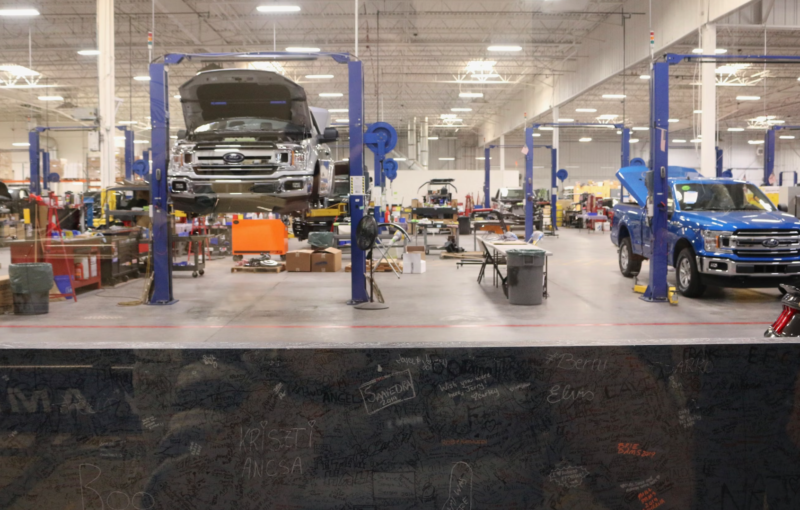



Photo by Laurel and Michael Evans on Unsplash
As an auto repair shop owner, we are sure that you understand the importance of a steady, well organized, and well educated team. However, the task of finding and mentoring the right talent is more complex than ordering parts for a tune-up. But not to worry, that’s why we are here to guide you!
In this blog, we will share our expert insights on how to build an exceptional auto repair team. Then, we will explain how you should guide your staff. If you ever need personalized help, just schedule an appointment with us here at You Net Results.
Before you dive into all of the steps needed to build your team, it is crucial that you know why a strong team is so vital for your auto repair shop. A skilled team will bring in the required skills that will grow customer satisfaction. In turn, that promotes a positive workplace. These factors directly impact your repair shop’s bottom line. Because of that, they make team building and mentorship non-negotiable parts of your business plan.
The first step to building a strong team is to put the right team member in place. As much as you can, you will need to pay attention to the following items:
Have you sought out and then hired the perfect staff members for your company? Don’t stop there! Go the extra mile. Provide your valued employees with the following perks:
Don’t neglect filling up your How-To Manual with SOPs on each and every task you expect your staff to perform. Standard Operating Procedures are key factors in helping your team members to grow and succeed!
Many employers often overlook mentoring staff. You should not, though. Your business will grow a lot, depending on how much improvement and growth your employees experience. To ensure this, you should embrace:
As you train, you should also make sure that you are fostering teamwork among your employees. To achieve this, use the following tools:
Keep an eye on Key Performance Indicators (KPIs) such as:
These metrics will help you gauge the efficiency of your team building, as well as your mentoring efforts.
Building and mentoring an top tier auto repair team is a long term investment. Still, there are so many rewards: happier employees, more satisfied customers, and a much healthier bottom line. At You Net Results, we all believe in empowering auto repair shop owners. We provide both the tools and the knowledge for you to excel at work.
Our coaching programs are designed in order to address your specific challenges. They will provide you with all the practical solutions to help you to achieve your business goals. When the landscape is as competitive as it is today, you can not afford to settle for a mid level team. Partner with us, so that you can make your staff your overall greatest asset!
Contact You Net Results today, so we can help you to begin the mentoring process. Book a free consultation. Brian Gillis and his team will help you to build your shop’s leadership foundation. Get plugged into a vast network of auto repair shops. We all work together in order to to strengthen the industry as a whole! We can help you make this month the best month of your entire business life!

A good team morale directly impacts productivity, customer service, and retention!
How can I boost my shop’s morale?

Shop owners share pay plans for the front of the house as well as back of the house. How are associates being incentivized to produce?

As an auto repair shop owner, you wear many hats every day. Often, you have to be the head mechanic, the marketing manager, and the CEO all in one. However, if you really want your business to grow, then you will need to learn how to delegate effectively.
Delegation is the key to building a successful team and freeing up your own time. When you do this, you will be able to focus on high level tasks that will help your business thrive. In this article, we will show you how to delegate and deliver effectively as a leader. You will also learn how to build a team that can help you achieve your ultimate goals.
Delegation is an essential skill for any leader. However, it is especially important for small business owners. When you are running a small business, there are only so many hours in the work day. You can not do everything yourself. Trying to do so will only lead you to burnout and frustration.
Effective delegation will allow you to leverage the skills and talents of your technicians, general managers, and service advisors. That way, you can focus on the tasks that only you, the owner, can do.
Delegating your tasks is not always the easy thing to do. As an auto shop business owner, you have probably built your repair business from the ground up. Therefore, you may have a hard time letting go of control. You may worry that no one can do things as well as you can do them. Maybe you are afraid that delegating jobs to your staff will take too much time and effort. However, if you really want your business to grow, then you will need to learn to delegate effectively.
Effective delegation has many benefits for your automotive repair business. It can:
Delegating daily tasks effectively is not just about handing off those jobs to your team members. It will also require very careful planning and communication on your part. Following up with your staff is the key. Here are some steps that you can take today in order to delegate effectively:
The first step in an effective delegation strategy is to identify the tasks that you actually can delegate to others. Look for the tasks that are:
Once you have identified the tasks you can delegate, then you can choose the right team member to handle the job. Look for team members who have the right skills and experience. These staff members should be continually motivated to take on new challenges. Consider delegating tasks as a way to help your staff members grow and develop their own skills.
In order to delegate effectively, you will need to provide clear instructions to your team member. Be specific about what you want them to do, and when you need it done. Also, stress the resources they have available to them. Make sure that your employee also understands the importance of the task. Emphasize how it fits into the bigger picture of your business. Remember, every job is important to making a business run, no matter how small it is.
Next, you will need to clear expectations for your team member. Define what success looks like for the task, as well as the metrics that you will use to measure progress. Make sure your employee knows exactly how to report back to you on their progress. It is also imperative that they know what to do if they should encounter any challenges.
Provide your team member with the support they need to succeed. Check in with them regularly in order to see how they’re doing. Then offer them guidance and feedback as needed. Celebrate their successes and help them learn from their mistakes.
Remember to identify all of the tasks that you can delegate. Then, when you choose the right team member, provide clear instructions and expectations for them. Finally, offer them your support and feedback.
With these skills, you can become a much more effective leader, while also growing your business. Do not be afraid to let go of control. Learn how to trust your team members to help you achieve your automotive shop’s goals.
Contact You Net Results today, and let us help you begin the process. Book a complimentary consultation. Brian Gillis and his team will help you build your leadership foundation and plug you into a vast network of auto repair shops. We all work together to strengthen the automotive industry! Let’s make June the best month of your business life!
Auto Repair Staff huddles are a crucial factor in encouraging employee teamwork. Listen to our YNR roundtable discussion on regularly rounding up your Technicians, General Managers, and Service Advisors to make sure you are all on the same page.
 Why Are Team Huddles Important?
Why Are Team Huddles Important?Brian kicked off the clip by outlining why we don’t want to neglect staff huddles. When we do not meet hourly with our employees, the negative effects can trickle down to customers. Not communicating with your Technicians and Service Advisors? Then get prepared for chaos! Gaps in your customer service game, missed opportunities, and, ultimately, a loss of revenue will occur. Brian noted that when customers complaint about pricing, the issue usually starts with poor customer service experiences.
Second, Brian gave examples of key components from our Huddles SOP. When huddling, you may want to work with a board system. Of course, the General Manager must call the meeting to order, and employ a timer so the meetings do not last too long. Primarily, these meetings involve Service Advisors at the front counter. Occasionally, you may want to call together your technicians in order to resolve issues, or make sure everyone is on the same page.
Next, Brian asked YNR Member Leon’s take on staff huddles. Leon, an experienced shop owner, recognizes the value of this ritual. It allows him to stay in the know about how each job is progressing. Understanding such details as the need for more parts and the timeline until he can report back to the customer is crucial.
 Your auto repair shop lacks direction. Maybe your business plan has stalled out, and you aren’t meeting your goals. You need an experienced automotive industry coach to help you. Then why not schedule a FREE business strategy session with You Net Results guide Brian Gillis? You’ve got nothing to lose, so sign up today!
Your auto repair shop lacks direction. Maybe your business plan has stalled out, and you aren’t meeting your goals. You need an experienced automotive industry coach to help you. Then why not schedule a FREE business strategy session with You Net Results guide Brian Gillis? You’ve got nothing to lose, so sign up today!
Are your auto repair staff members just order takers? Or are they truly difference makers for your customers? Technicians and Service Writers must work together in order to educate customers on their vehicles’ needs. Only then can automotive repair employees make a difference for your shop’s finances, as well as your customers’ safety and vehicle life.
 How Can Your Auto Repair Staff Make a Difference?
How Can Your Auto Repair Staff Make a Difference?Brian begins by presenting us with a customer entering the shop. Their vehicle is not riding smoothly enough, so we sell them a new set of sway bars. Big deal! Think of a waitress who only sells a chicken dinner to you. She doesn’t suggest a cocktail, an appetizer, or a dessert. Those items may have just brought our dining experience from good to great!
Just like the waitress in that story, the service advisor hasn’t made much of an impact. That auto repair staff member is just an order taker. They are not doing the most they can to help the customer, and they certainly aren’t making a difference in your shop’s bottom line.
If your auto repair staff want to be difference makers, they educate themselves about the make and model of the customers’ vehicle. They also take notes about the status of the customer’s car or truck. When they do this, they can inform the customer of necessary repairs they might not have even known they needed. Demonstrating the knowledge, then showing concern, is what gains a customer’s confidence. Only then can you rack up those “yes” answers, and earn the trust of a lifelong customer.
Does your auto repair staff lack direction? Perhaps your business plan has stalled out, and you need an experienced automotive industry coach to help you. Then why not schedule a FREE business strategy session with Brian? You’ve got nothing to lose, so sign up today!

